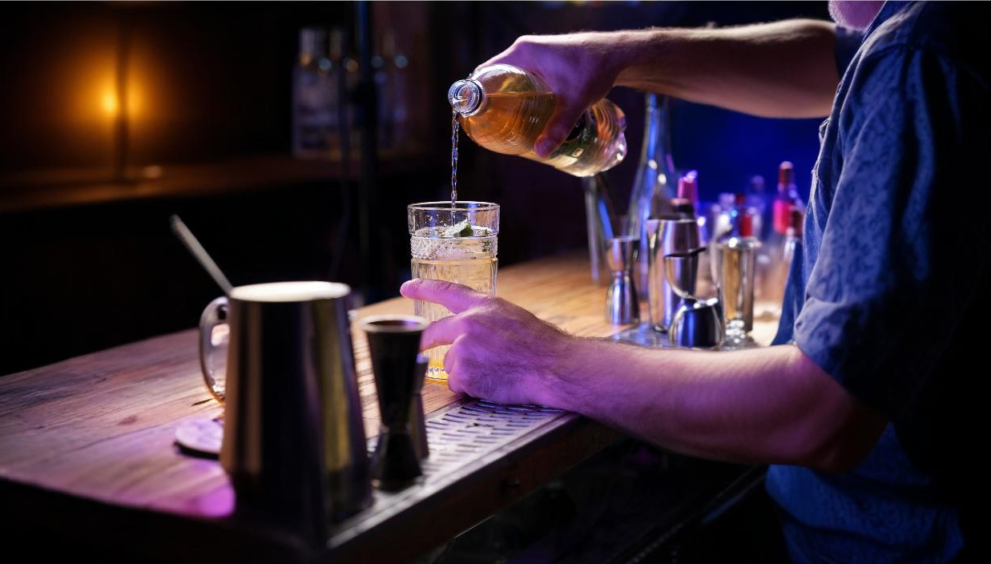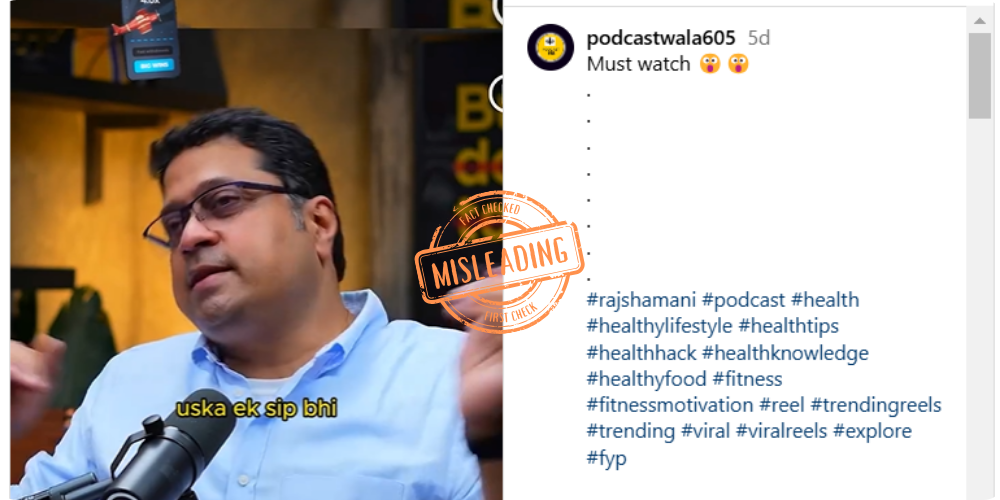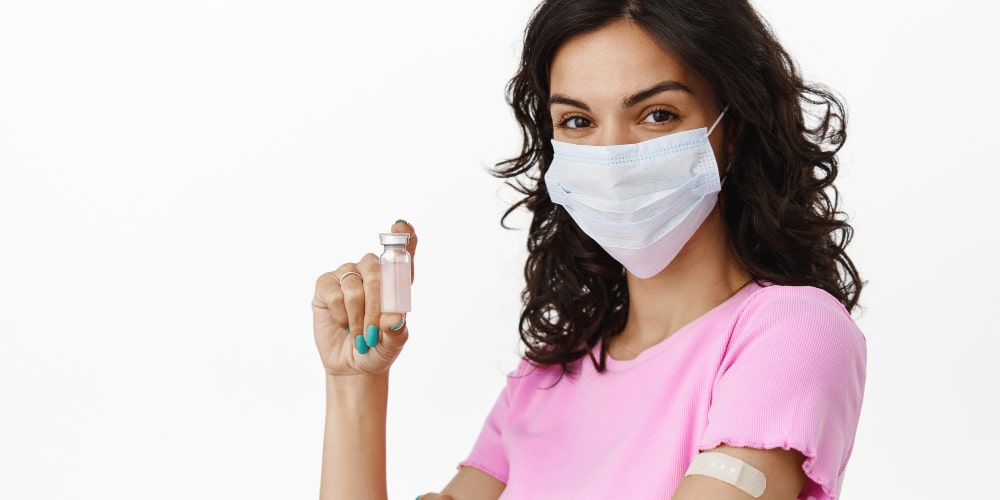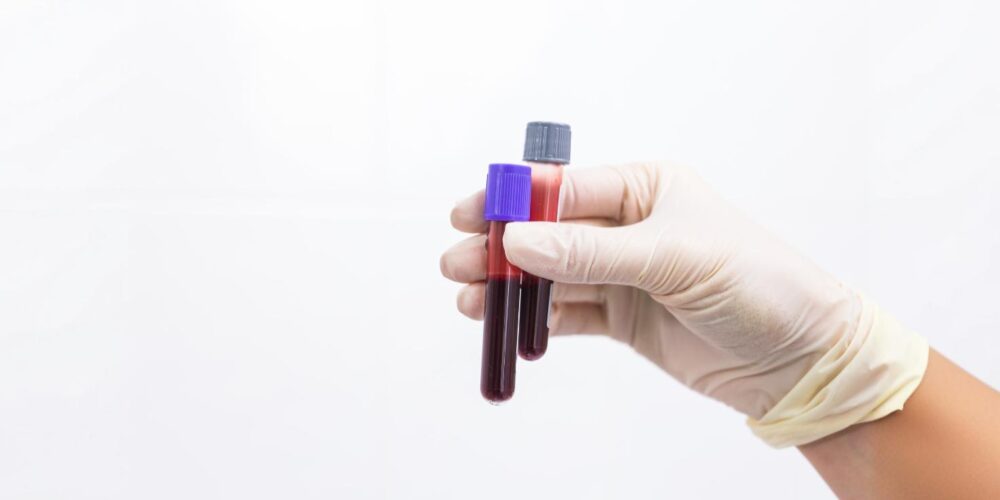FACT CHECK: Can a single sip of alcohol increase your risk for cancer?
While it is true that alcohol consumption is linked to an increased risk of certain cancers, the alarmist claim that a single sip leads to cancer risk oversimplifies the relationship
Author
Author
- admin / 1 year

- 0
- 6 min read

Author
CLAIM:
Even one sip of alcohol can put you at risk of cancer.
FACT:
While alcohol consumption is linked to an increased risk of certain cancers, the claim that a single sip leads to cancer risk oversimplifies the relationship. The risk depends on the amount and frequency of consumption, as well as individual health and lifestyle factors.
A viral reel on Instagram, which has about 5.4 million views and close to 81,000 likes in just 5 days, claims that even “one sip” of alcohol can put an individual at risk for cancer.
The video features social media influencer and podcaster, Raj Shamani, in conversation with oncologist Dr Mandar Nadkarni, discussing how alcohol increases risk of breast cancer.“Those who drink alcohol, their chances of developing breast cancer increases,” asks Shamani in the video.
“Breast is only one cancer that alcohol increases (the chances of). There are all possible cancers, head to foot- from mouth cancer to tongue cancer to floor of mouth to oropharyngeal cancer to oesophageal cancer to stomach cancer to small intestinal cancers to kidney cancers to bladder cancers, liver cancers, breast cancer, everything increases with alcohol,” the doctor responds.
Alarmingly, the doctor goes on to add that “even if you have one sip, it is harmful! It is now like tobacco!”

“A while back, alcohol was given some leeway; that if you only have a little, it is ok, it is safe, it is good for you. It is not bad. Today, even if you have a spoonful, it is class 1 carcinogen,” he adds.
The video appears to be cut from a larger YouTube podcast video, done by Shamani. Shamani himself had also posted a similar, but slightly longer, reel with a straight claim that “Alcohol Can Cause You Cancer,” just a day later. This video has also garnered close to a million views and over 25,000 likes.
While it is true that alcohol consumption is linked to an increased risk of certain cancers, the alarmist claim that a single sip leads to cancer risk oversimplifies the relationship. The risk depends on the amount and frequency of consumption, as well as individual health and lifestyle factors, according to research and experts.
Can drinking alcohol cause cancer?
It is true that risk of developing cancer increases substantially the more alcohol is consumed. In fact, newer studies and research warn against even light or moderate drinking.
Latest available data indicate that half of all alcohol-attributable cancers in the WHO European Region are caused by “light” and “moderate” alcohol consumption.
According to a Lancet study titled “Global burden of cancer in 2020 attributable to alcohol consumption: a population-based study,” light to moderate alcohol consumption (<20 g of pure alcohol per day) was associated with almost 23,000 new cancer cases in 2017 in the EU.
This accounted for 13.3% of all alcohol-attributable cancers and 2.3% of all cases of seven alcohol-related cancer types. Notably, nearly half of these cancers (approximately 11,000 cases) were female breast cancers. Additionally, more than a third of the cancer cases attributed to light to moderate drinking (approximately 8,500 cases) were associated with light drinking levels (<10 g per day).
The Lancet study highlights that increasing levels of alcohol use correlate with increasing levels of illness and mortality risk. However, it underscores that no evidence suggests a safe threshold for alcohol consumption concerning cancer risk.
A statement by WHO also clarifies that currently available evidence cannot indicate the existence of a threshold at which the carcinogenic effects of alcohol start to manifest in the human body.
Dr Carina Ferreira-Borges, acting Unit Lead for Noncommunicable Disease Management and Regional Advisor for Alcohol and Illicit Drugs in the WHO Regional Office for Europe explains, “We cannot talk about a so-called safe level of alcohol use. It doesn’t matter how much you drink – the risk to the drinker’s health starts from the first drop of any alcoholic beverage. The only thing that we can say for sure is that the more you drink, the more harmful it is – or, in other words, the less you drink, the safer it is.”
So does that mean even a “sip” of alcohol could cause cancer?
Even though there are no “safe” thresholds for alcohol consumption anymore, experts First Check spoke to said that the alarmist oversimplification in the video may not be entirely correct either.
Dr Kanika Sood Sharma, Director and Clinical Lead – Radiation Oncology at Narayana Health, said the claim that a single sip of alcohol can cause cancer oversimplifies a complex issue.
“Most studies on alcohol and cancer rely on cohort observations, which do not account for various confounding factors,” she explained.
She noted that while alcohol independently increases the risk of certain cancers like those of the food pipe and stomach, the risk significantly amplifies when combined with smoking or other synergistic effects.
Discussing how alcohol interacts with the body, Dr. Sharma described it as an irritant to the gastrointestinal mucosa. She added, “Prolonged and frequent exposure can lead to mucosal damage, increasing cancer risk. Factors such as diet—like spicy or very hot foods—and chemical exposure further contribute to this risk.”
Addressing the threshold question, Dr. Sharma highlighted the World Health Organization’s stance that there is no safe level of alcohol consumption when it comes to cancer risk. However, she clarified that no definitive threshold has been identified for when carcinogenic effects begin to manifest.
“Unlike studies on pollution’s impact on cancer, research on alcohol lacks precise quantification of risk based on specific consumption levels,” she said.
She also pointed to genetic factors as crucial in determining an individual’s susceptibility to alcohol-related cancers. “Variations in how the body metabolizes alcohol—particularly involving liver enzymes—play a significant role. People with chronic liver disease or viral infections like hepatitis face even higher risks,” Dr. Sharma said.
Thus, the claim that a single sip of alcohol may cause cancer is oversimplified and misleading. While alcohol consumption is linked to cancer, the degree of risk depends on cumulative exposure, lifestyle, and genetic factors.
Also read: Fact-check: The effect of alcohol on blood glucose levels – First Check
Do you have a health-related claim that you would like us to fact-check? Send it to us, and we will fact-check it for you! You can send it on WhatsApp at +91-9311223141, mail us at hello@firstcheck.in, or click here to submit it online.










